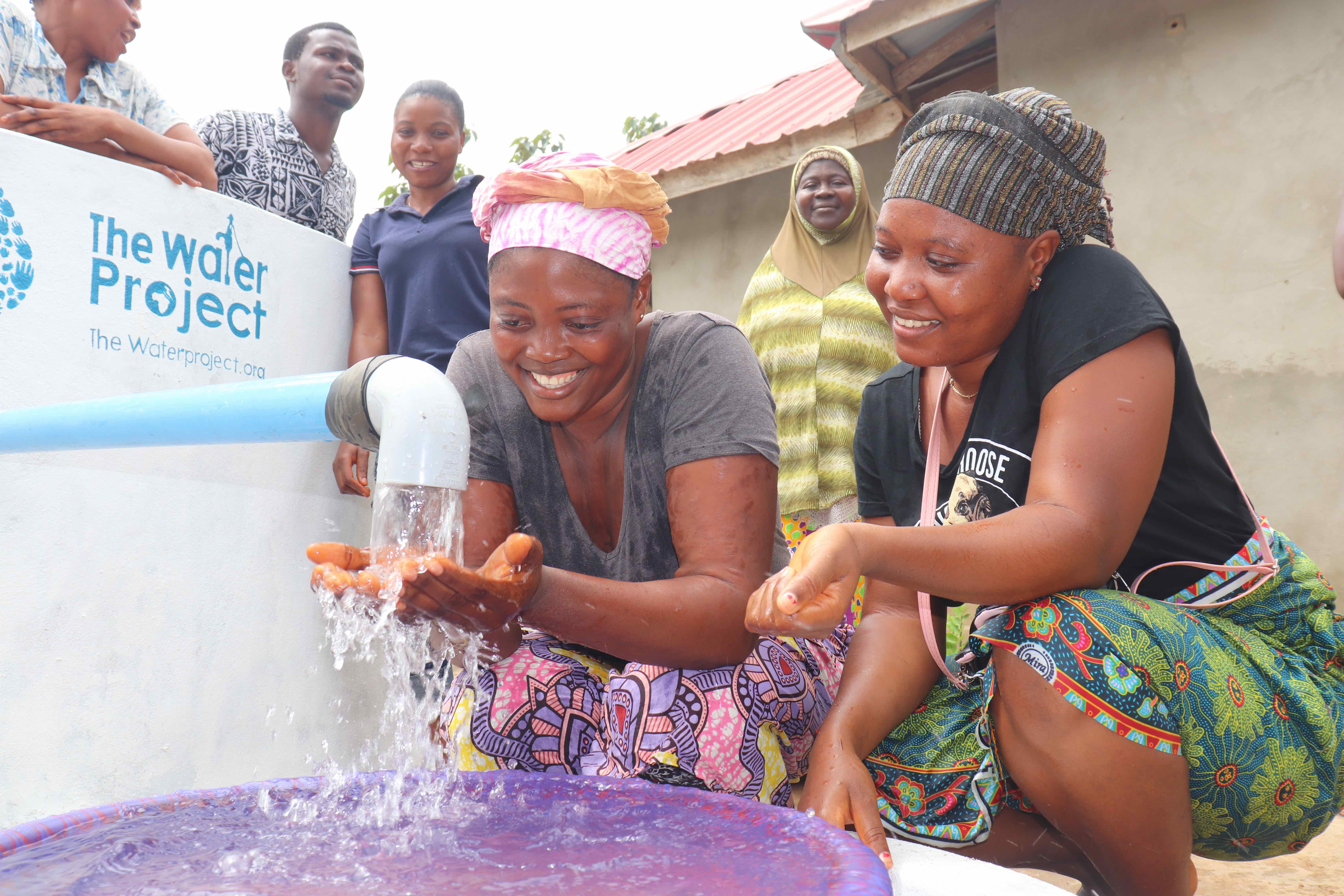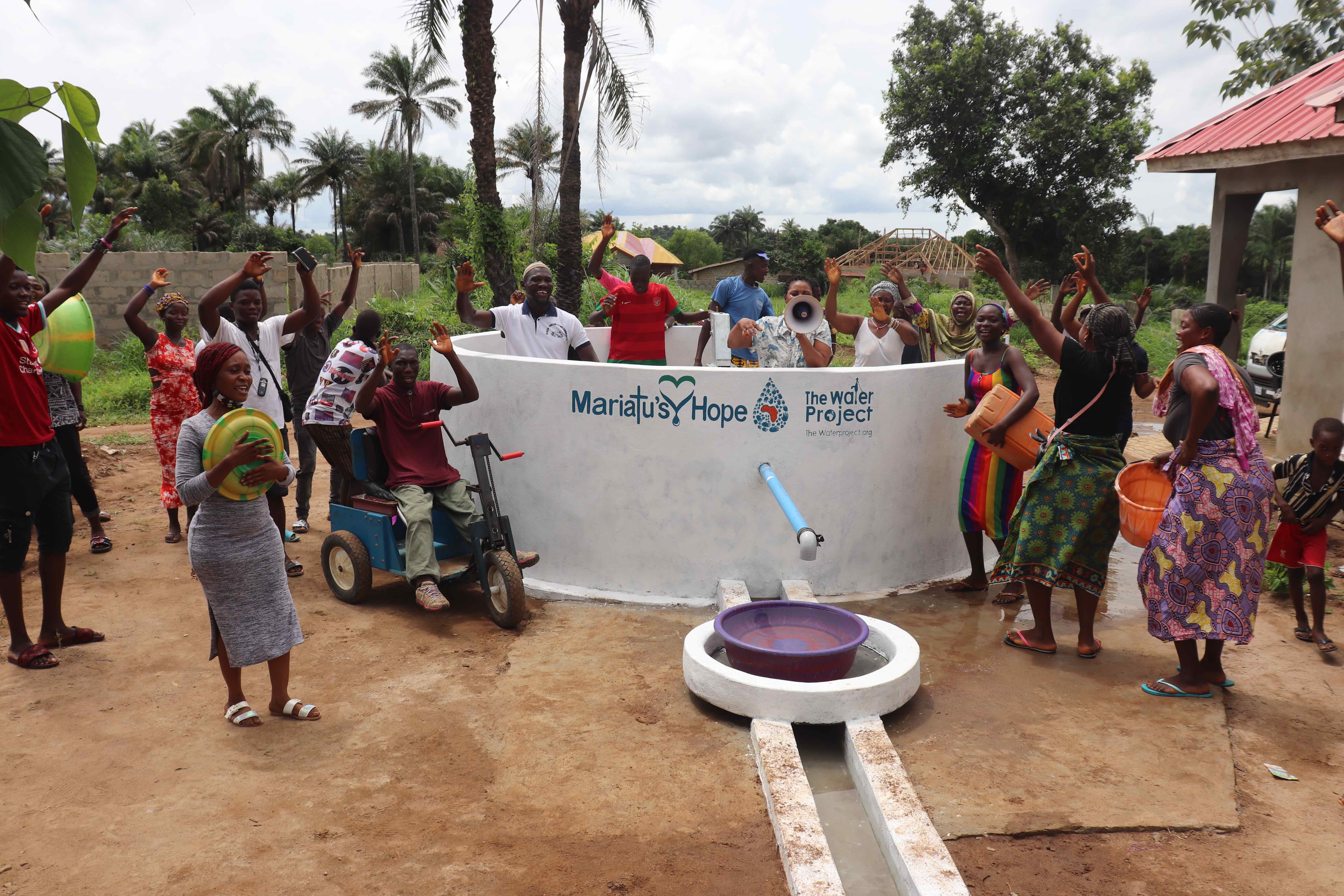September, 2021: New London, #10 Off Mansaray Street Well Project Complete!
We are excited to share that there is a safe, reliable borehole well in New London, off Mansaray Street. As a result, the community members no longer have to rely on unsafe water to meet their daily needs. We also conducted hygiene and sanitation training, which focused on healthy practices such as handwashing and using latrines.

New Well
The drilling of this new borehole was a success, and clean water is flowing!
"I believe that water is life, and because of that, this water point will positively impact my life and the entire community," said George Sankoh, 47, a local teacher. George was also elected as the Chairperson of the new water user committee.
George and his wife both have disabilities, which is why this well was built to be accessible for all users.
George went on: "Considering our condition, it was exceedingly difficult for us to get access to a water source that is disabled-friendly. Today, it is a privilege for us to get a safe, reliable, and disabled-friendly water point at our doorstep."

The dedication ceremony was held on a beautiful, sunny day. Along with local District Council and Ministry of Water dignitaries, the event was also graced by the Chairman of the local council of Persons with Disability and several other invited community members with disabilities who are excited about the new possibilities this water point will open for them.

George (left) with the Chairman of the local council for Persons with Disability (right).
"This community relied on [an] unprotected well as the main water source," George Sankoh said. "It was extremely difficult for the community to get safe drinking water. Most of us had to buy packet water to drink. I can now apportion that cost to another need of the family. I have been praying for this opportunity [since] long ago. Now that it has happened, I am very grateful."
The Process
The drill team arrived the day before beginning work. They set up camp and unpacked all their tools and supplies to prepare for drilling the next day. The community provided space for the team to store their belongings, along with meals for the duration of their stay. The following day, the work began.

Our team dug two pits next to the drill rig, one for the drill’s water supply and another for what the drill pulls out of the borehole. In some cases, we order a private supplier to deliver the water for drilling since water access is already a challenge.
Day one of drilling began with the team filling the two pits with water mixed with bentonite, an absorbing, swelling clay. Next, the team fixed a four-inch carbide-tipped bit to the five-foot-long drill stem. They started the mud pump to supply water to the drill rig so that drilling could begin!

The team took material samples after putting each five-foot length of drill stem into the hole. We labeled the bags so we could review them later to determine the aquifer locations.
On the second day of drilling, the team expanded the hole and cleared it of mud. After reaching a total depth of 29 meters, the team forcefully pumped clean water into the well to clear any mud and debris from the drilling process. We then protected the screened pipe by adding a filter pack. The team hoisted the temporary drilling casing to fortify the pipes with cement.
Next, we bailed the well by hand for three days before conducting a yield test to verify the water quantity.

Yield test.
The static water level is 11 meters. With these excellent results, we installed a stainless steel India MkII pump. Water quality test results showed that this is clean water fit for drinking!
New Knowledge
Before conducting any hygiene training, we made repeated phone calls and visits to the local water user committee to understand better the community’s challenges and lack of sanitation facilities. We shared the findings from our discussions with the committee members to help them make the necessary adjustments before the training began. For example, we identified households without handwashing stations or ones that may need to repair their latrines. With this information, community members worked together to improve hygiene and sanitation at home.
After this preparatory period, we scheduled a time when members from each household using the water point could attend a multi-day hygiene and sanitation training. We then dispatched our teams to the agreed-upon location to hold the meeting.
On the first day, the training was held on George Sankoh's porch, which was a little cramped, but participants were still attentive.

The second day, George found a more suitable venue: an under-construction building. This site, too, was a little small, but we coped!

Training topics covered included handwashing and tippy taps, good and bad hygiene habits, disease transmission and prevention, worms and parasites, dental hygiene, proper care of the well's pump, keeping the water clean, the cost recovery system, dish racks and clotheslines, the importance of toilets, keeping latrines clean, balanced diets, the diarrhea doll, and HIV and AIDS.
The most interesting training topic for this community was the construction of tippy-tap handwashing stations. All participants had been asked to bring a one-gallon container, about which there had been much speculation. Some community members even thought they would walk away with a donation of cooking oil! Instead, they were astounded to learn that they could transform an ordinary container into a tool they could use to better their community's hygiene.

Some participants rushed to the table to construct their tippy taps immediately. The participants promised to help their fellow community members in constructing their own versions. They said they would create many handwashing stations and continue the proper handwashing techniques.
The second most memorable topic was childhood nutrition. This session was very interactive: everyone was whispering to each other when balanced diets and food nutrients were measured. You could see the guilt on their faces as the facilitator explained how children need to be given a balanced diet, because it is necessary for their growth.

A participant explained how he had been depriving his children of eating fish and fruit, because he feared his children would be infested with worms or could get malaria from them. He said he felt so bad for his children and needed to ask for their forgiveness right away. He will now allow them to eat all that their body needs for proper functioning.
Other participants mentioned that they thought children were to eat rice only, and no meat or fish, which they believe would prompt them to steal or get initiated into witchcraft. Some foodstuffs were also forbidden even for adults. For instance, pregnant women in their community are not allowed to eat eggs or plantains for fear that the unborn children might become thieves. They were happy about the training and promised to change for the better.

Baindu Gray, a 57-year-old farmer, shared how the training impacted her: "Through this training, I have attained the skills and knowledge on how to take proper care of food, environment, and family, which is very paramount. I am calling on everyone who has witnessed this training to pass on this message to fellow community members so that all hands will be on deck to work for the development of this community and for our own wellbeing."
"I strongly believe that if we as a community adhere to the advice given to us, we will stay safe and healthy in this community," George Sankoh concluded.
Thank you for making all of this possible!


 Borehole Well and Hand Pump
Borehole Well and Hand Pump
 Rehabilitation Project
Rehabilitation Project
































